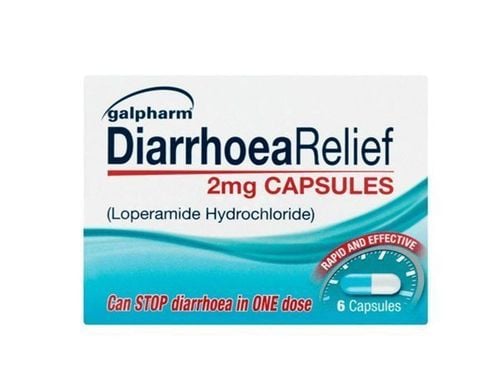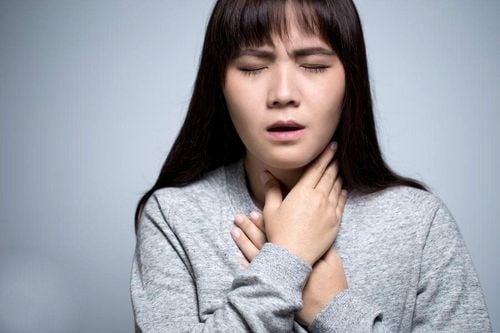This is an automatically translated article.
Posted by Master, Doctor Mai Vien Phuong - Department of Examination & Internal Medicine - Vinmec Central Park International General Hospital
Laryngeal reflux is defined as the reflux of gastric contents into the larynx and pharynx. A large amount of data suggest an increasing prevalence of laryngeal symptoms in patients with GERD. There are limited results to evaluate the effectiveness of reflux treatments (including dietary and lifestyle changes, medical therapy, anti-reflux surgery) for laryngeal reflux.
1. Manifestations of gastroesophageal reflux disease
Laryngeal reflux can be manifested by laryngeal symptoms such as cough, sore throat, hoarseness, difficulty breathing and swallowing, as well as signs of laryngeal irritation on laryngoscopy. Laryngeal symptoms are increasingly recognized by general practitioners, pulmonologists, and ENT surgeons. In particular, there is a large amount of data on the increasing incidence of laryngeal symptoms in 60% of patients with GERD. In addition, several studies support the view that gastroesophageal reflux disease, as well as smoking and alcohol use, are risk factors for colon cancer. According to the Montreal Consensus, several important issues were highlighted, as follows:
Rarity of isolated extraesophageal syndromes that do not present concomitantly with reflux disease symptoms typical gastroesophageal reflux (ie, heartburn and regurgitation); Extraesophageal syndrome is often multifactorial with gastroesophageal reflux disease being one of several potential cofactors for exacerbation; Data supporting a beneficial effect of reflux therapy for extraesophageal syndromes are weak. Subsequently, the American Gastroenterological Association guidelines for gastroesophageal reflux disease recommend against the use of acid suppression therapy for acute treatment of patients with gastroesophageal reflux disease syndrome. extraesophageal (laryngitis, asthma) in the absence of typical symptoms of gastroesophageal reflux disease.
2. The role of lifestyle changes in the treatment of reflux laryngitis
Dietary and lifestyle modifications are effective interventions for GERD, despite the fact that there are few robust published data. According to the treatment used at a UK county general hospital, dietary and behavioral modifications have also been found to be very effective in managing laryngopharyngeal reflux.
The positive effects of lifestyle modification versus the uncertain effects of efficacy in the treatment of laryngospasm.
Lifestyle changes in the treatment of laryngeal reflux
| Những phương pháp được đề xuất để điều trị trào ngược thanh quản | Những phương pháp không chắc chắn sẽ cải thiện tình trạng bệnh |
|
Điều trị béo phì / thừa cân • Giảm lượng calo tiêu thụ hàng ngày • Hoạt động thể chất hiếu khí |
• Giảm cân ở BMI bình thường |
|
Thay đổi thói quen ăn uống: - Tăng lượng chất xơ - Tăng lượng trái cây và rau quả - Giảm lượng thức ăn cay và ngọt - Giảm lượng đồ uống chứa carbohydrate |
• Giảm lượng đồ uống có tính axit (nước cam hoặc nước táo) • Giảm lượng cà chua, nước sốt cà chua, bạc hà và tỏi |
| Giảm hút thuốc lá | |
| Giảm uống rượu và cà phê | |
| Nâng cao đầu giường | |
| Tránh các bài tập vất vả |
Treatment of obesity
The prevalence of obesity in Western countries has increased significantly, and this has coincided with an increase in the number of patients with gastroesophageal reflux disease. Numerous epidemiological studies have clearly demonstrated an association between obesity and GERD, and investigations support a biologically plausible relationship between obesity and GERD. Stomach.
In particular, various studies have shown an association between higher body mass index (BMI) and gastroesophageal reflux disease and also obesity (BMI > 30 kg/m2) and overweight. (BMI 25–30 kg/m2) are both associated with gastroesophageal reflux disease. The effect of BMI on the occurrence of gastroesophageal reflux disease does not appear to be dependent on total calories, fiber intake, fruits and vegetables, or other macro or micronutrients. Obesity is thought to alter the morphology and function of the esophageal joint (EGJ).
Eating habits
Although there are few data on this, in clinical practice different foods are indicated to influence the occurrence of reflux and, in general, patients is advised not to take food late in the evening.
High-fat foods and chocolate are indicated empirically as foods that can reduce lower esophageal sphincter pressure or prolong gastric emptying time; however, no discontinuation trials have evaluated the impact on GERD outcomes. Heartburn can be aggravated by spicy foods by directly irritating the already inflamed esophageal lining. In particular, Nebel et al. describe that 88% of patients cited spicy foods as the cause of their heartburn. Orange juice was associated with GERD symptoms even when orange juice infusion did not change lower esophageal sphincter pressure.

Reduce carbonated drinks
Carbonated drinks are associated with promoting GERD symptoms by reducing lower esophageal sphincter pressure and found to predict reflux disease symptoms gastroesophageal reflux in a multivariate analysis.
Coffee has been reported to cause reflux episodes. A case-control study in Norway reported a negative association between gastroesophageal reflux disease and coffee (odds ratio [OR] 0.5; 95% confidence interval [CI] 0.4) –0.6) between subjects who drank 4–7 cups per day compared with those who did not drink coffee.
Liberal habits: smoking and drinking
Very little data are available for liberal habits such as smoking and drinking. Smokers have an increased incidence of reflux symptoms compared with non-smokers. The association between smoking and prolonged acid exposure, decreased lower esophageal sphincter pressure and decreased salivation, and decreased rate of esophageal acid clearance has been examined. However, pH measurement did not report an increased duration of esophageal acid exposure in smokers compared with non-smokers despite prior experience of increased reflux episodes. In general, there are inconclusive data on the effect of smoking cessation on the outcome of gastroesophageal reflux disease
Vinmec International General Hospital examines and treats laryngeal reflux diseases with the most optimal internal - surgical methods for patients, both children and adults. Coming to Vinmec International General Hospital, patients will receive a direct, dedicated and professional examination from a team of qualified and experienced medical staff.
If you have a need for consultation and examination at Vinmec Hospitals under the nationwide health system, please book an appointment on the website for service.
Please dial HOTLINE for more information or register for an appointment HERE. Download MyVinmec app to make appointments faster and to manage your bookings easily.
ReferencesIrene Martinucci, Nicola de Bortoli, Optimal treatment of laryngopharyngeal reflux disease, Ther Adv Chronic Dis. 2013 Nov; 4(6): 287–301. Altman K., Prufer N., Vaezi M. (2011) A review of clinical practice guidelines for reflux disease: towards creating a clinical protocol for the otolaryngologist. Laryngoscope 121: 717–723 [PubMed] [Google Scholar] Anderson J., Jhaveri M. (2010) Reductions in medications with significant weight loss with behavioral intervention. Curr Clin Pharmacol 5: 232–238 [PubMed] [Google Scholar]














